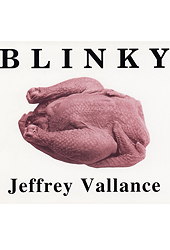Underwear
Underwear Trading Cards
An idea recently introduced by Hanes, which is putting trading cards featuring Michael Jordan modeling underwear into packs of their men's underwear. From the press release:If there's a total of 170 different cards, how much underwear would you need to buy to get them all?
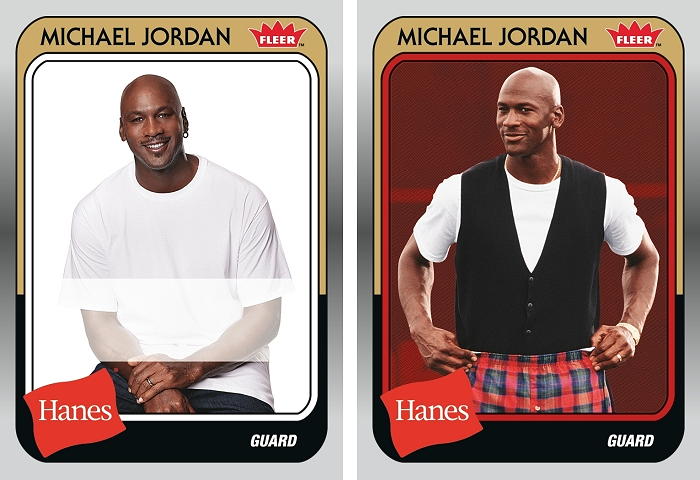
Posted By: Alex - Thu Mar 21, 2019 -
Comments (0)
Category: Collectors, Underwear
Bras for Cows
Apparently, they exist. Farm Show magazine explains:

Long Beach Independent Press-Telegram - July 2, 1977
Posted By: Alex - Wed Jan 30, 2019 -
Comments (2)
Category: Fashion, Underwear, Cows
The Techno-Bra
Created by Kursty Groves. The bra monitored the wearer’s heartbeat and contacted the police if there was a sudden change indicative of a panic response (suggesting that the wearer was being attacked or in danger). The bra was reportedly going to be manufactured and sold by the British design firm PDD, but as far as I can tell, it never made it to market.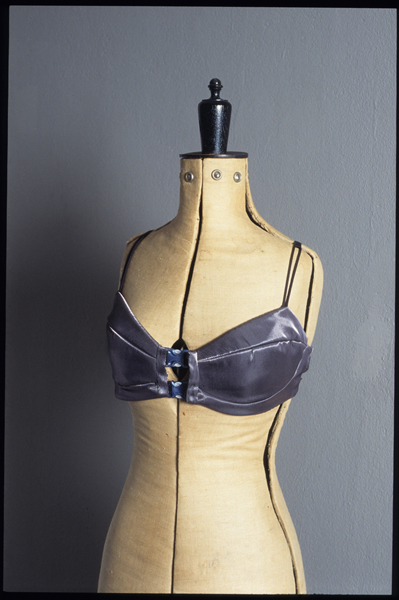
Image source: Visual Arts Data Service
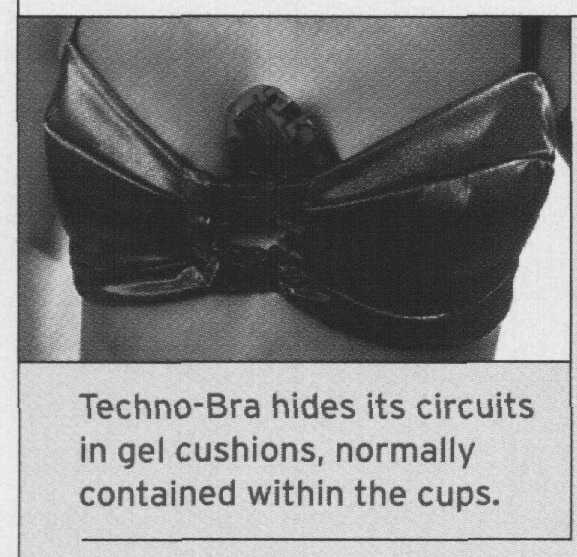
Discover magazine - October 1999
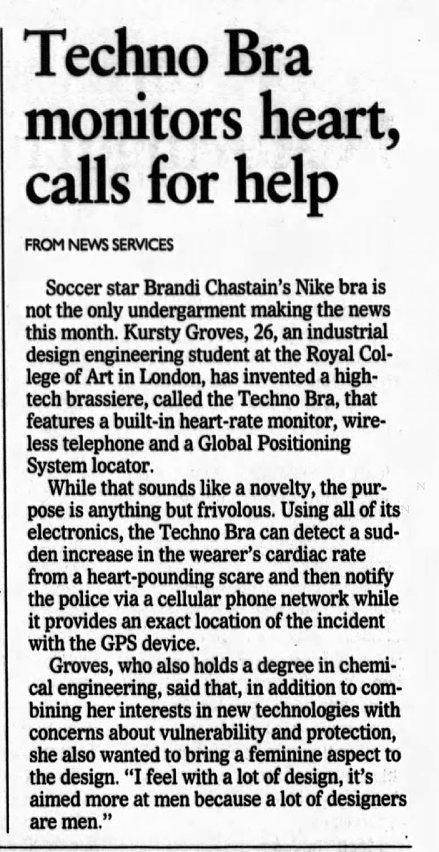
Atlanta Constitution - July 25, 1999
Posted By: Alex - Tue Jan 22, 2019 -
Comments (8)
Category: Fashion, Underwear, 1990s
TV Panties
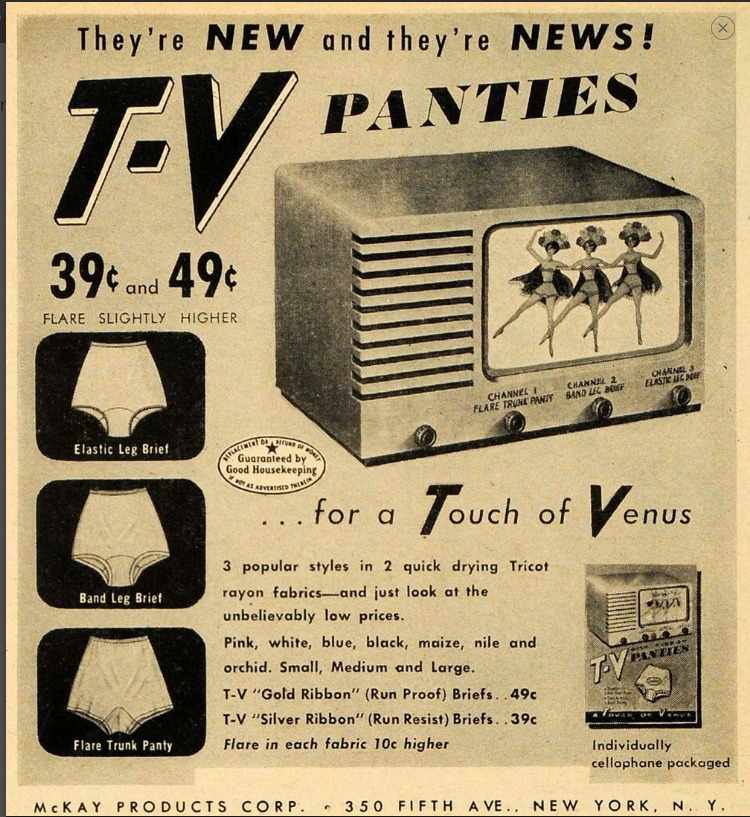
Source.
Posted By: Paul - Sun Aug 26, 2018 -
Comments (4)
Category: Business, Advertising, Underwear, 1940s
Sinderella and the Golden Bra
Posted By: Paul - Sun Aug 05, 2018 -
Comments (1)
Category: Ineptness, Crudity, Talentlessness, Kitsch, and Bad Art, Exploitation and Grindhouse, Underwear, 1960s
No-Wash Underwear
Organic Basics boasts that its Silvertech 2.0 line of underwear has been treated with anti-microbial silver chloride, and therefore never needs to be washed. Or, at least, only needs to be washed every few weeks.Maybe that pitch works for some people, but it doesn't work for me. I don't want to be rewearing a pair of sweaty, old underwear, even if it has been anti-microbially treated.
Product page (Kickstarter)



Posted By: Alex - Sun Jul 22, 2018 -
Comments (5)
Category: Hygiene, Underwear
Rock ‘n’ Roll Underwear
From Omni magazine (Aug 1981): "The latest discotechnological breakthrough is an item called Rock and Roll Hot Pants. By wiring your shorts or panties to a stereo speaker with a 15-foot cord, which relays the music to a two inch disc on your waistband,”you get an incredible tingle all over your body,” claims inventor David Lloyd."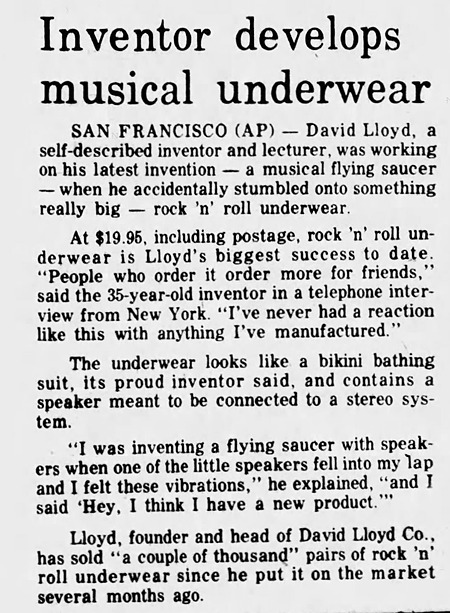
Santa Rosa Press Democrat - Jan 27, 1981
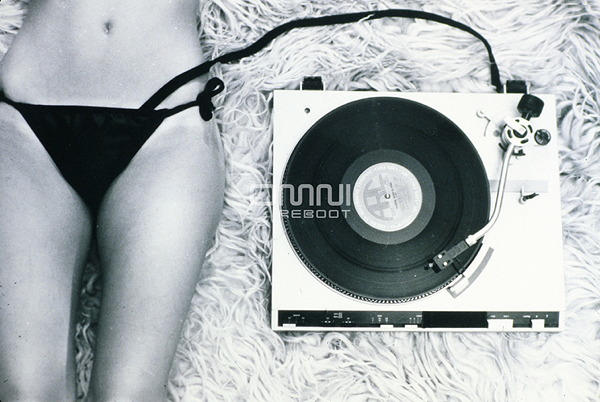
Omni magazine - August 1981
Posted By: Alex - Sat May 12, 2018 -
Comments (6)
Category: Inventions, Music, Underwear, 1980s
Inflatable Underpants
I wonder where Katsuo Katugoru was during the big 2011 tsunami... if he got a chance to use his invention.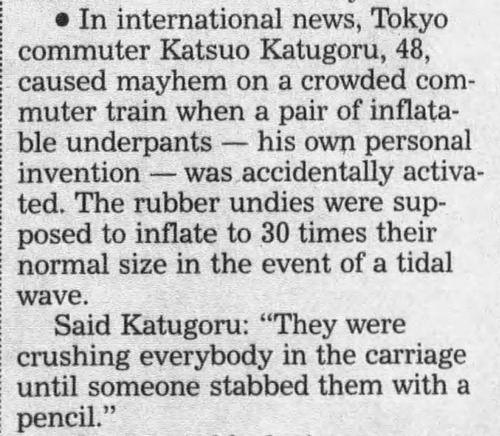
Orlando Sentinel - Aug 23, 1998
Update: I've concluded that Katsuo's inflatable underpants were fake news. Never happened. Columnist Mark Gibbs called it out as such in his May 4, 1998 column in Network World magazine. He also offered some prescient thoughts about the emergence and possible consequences of the fake-news phenomenon:
— Unsubstantiated story carried March 3, 1998, by London's Daily Telegraph, National Public Radio and many other serious news organizations.
What's interesting about this story (other than the weirdness) is the coverage the story received. According to some reports, The Associated Press sourced it, but no one has been able to find any AP reference. You have to wonder how the likes of NPR and the Daily Telegraph could run with it.
What the event illustrates is a phenomenon that will become increasingly common — the Internet raising gossip, jokes and misinformation to the status of truth. This is what I call "anti-data." Anti-data is not the opposite of data, rather it is the stuff that dilutes and invalidates the data you need.
Part of the reason anti-data exists is because the Internet supports the rapid transfer of huge amounts of what we'll call, for the sake of argument, "news." Way back in 1967, Marshall McLuhan noted the consequence of speedy news delivery as a general trend of modern media in "The Medium is the Message: An Inventory of Effects," (p. 63):
Information pours upon us, instantaneously and continuously. As soon as information is acquired, it is very rapidly replaced by still newer information. Our electrically configured world has forced us to move from the habit of data classification to the mode of pattern recognition.
The Internet amplifies this effect and applies it not only to news but also to intelligence about markets, people and business concerns in general.
To corporations, this should be a great concern. As your employees begin to rely on pattern recognition over data analysis, generally their judgment will become less consistent.
Their correct conclusions may well become more accurate, but their wrong ones will tend toward the catastrophic. These extremes might average the same as prior judgments, but the fact that the highs are stellar and the lows, abysmal, will induce chaotic behavior.
Posted By: Alex - Tue Apr 17, 2018 -
Comments (5)
Category: Inventions, Underwear, 1990s
The Blessing of the Bras
June 1986: "Buddhist priests blessed 200,000 used brassieres yesterday in a temple memorial service for cast-off underwear."
Tampa Tribune - June 8, 1986

Philadelphia Daily News - June 7, 1986
Posted By: Alex - Mon Apr 09, 2018 -
Comments (3)
Category: Religion, Underwear, 1980s
Important mother-daughter conversation
I'm not sure of the exact date when this ran, but from the price of the shirts, it must have been sometime in the 1960s.
Posted By: Alex - Mon Mar 26, 2018 -
Comments (6)
Category: Advertising, Underwear

| Who We Are |
|---|
| Alex Boese Alex is the creator and curator of the Museum of Hoaxes. He's also the author of various weird, non-fiction, science-themed books such as Elephants on Acid and Psychedelic Apes. Paul Di Filippo Paul has been paid to put weird ideas into fictional form for over thirty years, in his career as a noted science fiction writer. He has recently begun blogging on many curious topics with three fellow writers at The Inferior 4+1. Contact Us |




